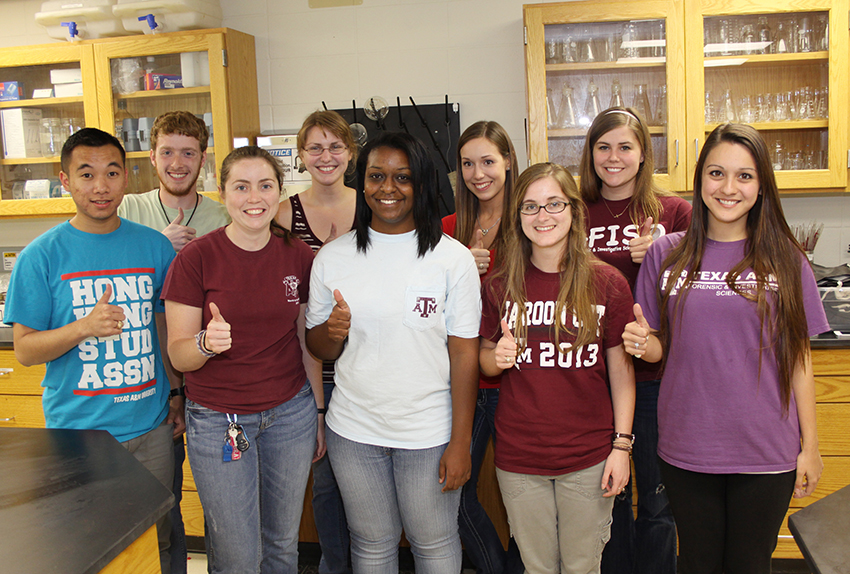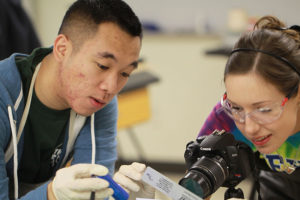
Nine Forensic and Investigative Sciences students received Forensic Technician certificates this May. Pictured are from left to right: Back row: Kyle Beckman, Caitlin Otto, Ashley Maynard, and Lauren Frankino. Front row: Ashley Maynard, Charnae’ Kearney, Charlotte Dearman and Kelsey Muniz.
BRYAN, Texas – Nine Forensic and Investigative Sciences students are now ready to work as technicians as they recently received their Forensic Technician certificates after the Texas Forensic Science Academy’s Latent Print Processing course at Riverside Campus on Friday, May 23.

Jeffrey Ng, left, shows Juliane Hough how to photograph an image of a fingerprint during a lab session of the Texas Forensic Science Academy’s Latent Print Processing course. Photo by Rob Williams
The May minimester recipients were Caitlin Otto, Kyle Beckman, Juliane Hough, Charlotte Dearman, Ashley Maynard, Lauren Frankino, Charnae’ Kearney, Kelsey Muniz, and Jeffrey Ng. Also participating in the course was Kelsey Garner.
The students were selected to participate in two courses during the spring semester that are part of a partnership with the Texas A&M Engineering Extension Service and the Department of Entomology’s Forensic and Investigative Sciences program. Held each January and May, the courses are designed to give students hands-on experience in techniques used by law enforcement professionals worldwide.
The program’s total of 80 hours of instruction consists of two 40-hour-long courses in latent fingerprint processing and crime scene investigation techniques. During these courses, the students receive lecture type and hands-on training using the latest technology and techniques used in the real world.
In the Latent Print Processing course, students learned different basic techniques for processing latent fingerprints and enhancing visible prints from crime scenes. They also received instruction in taking and processing prints from physical evidence collected from the scene, as well as correctly photographing processed prints for recording. The crime scene investigation course covers such topics as crime scene searches, scene documentation and proper evidence handling. Students completing both 40-hour courses earn a Forensic Technician Certificate and receive elective credit towards their degrees.
Jeffrey Ng recently graduated with his Bachelor of Science in Forensic and Investigative Sciences with a Science Emphasis in May and was taking this course to complete his certification.
Ng enjoyed participating in both courses and said that taking both were very important in keeping up to date with the latest techniques law enforcement uses in the field. “The courses are great and they give a lot of hands-on experience,” he said. “They will definitely help me to be more confident in what I am doing.”

Charlotte Dearman taking a photo of a fingerprint that was collected during class. Photo by Rob Williams
Senior Charlotte Dearman loved the courses and said both were beneficial in helping her to prepare for the future.
“I think that this course will be really helpful in my future career,” she said. “Everything we are doing here helps us greatly and is applicable to what’s out there in the world.”
The Forensic and Investigative Sciences degree program at Texas A&M prepares students for careers that involve the collection, preservation, processing and use of evidence and information to solve problems. These careers include law, medicine, homeland security, public safety, political science, environmental quality, agriculture, public health, chemistry, anthropology, physics, computer science and business.
The partnership between the academic Forensic and Investigative Sciences program within the Department of Entomology and the vocational training provided by the TEEX Texas Forensic Science Academy is an example of a multiagency partnership putting students first. This partnership between faculty and students of TAMU’s Forensic and Investigative Sciences program and experts from TEEX’s Forensic Science Academy continues to strengthen the curriculum at Texas A&M and offer students an opportunity to participate in cutting-edge technologies and current field methods.